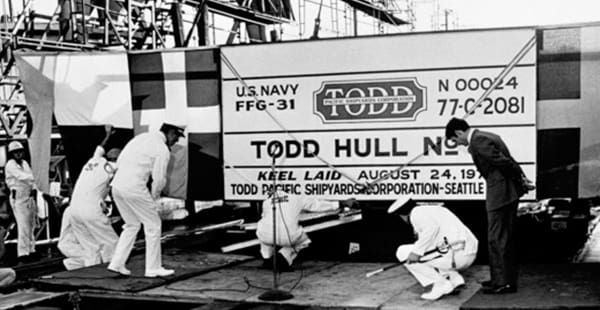01. History
Todd Shipyards – Seattle History
William H. Todd formed Todd Shipyards out of several smaller shipyards during World War I (WWI). It went on to become the largest independent shipyard in the country. Initially based out of Seattle, Washington and the East Coast, Todd Shipyards eventually operated plants in Washington, New Jersey, New York, Texas, Louisiana and California.
In 1918, the Seattle operations moved to Harbor Island, a man-made industrial island in Elliot Bay. During WWI, the Seattle and Tacoma plants worked around the clock, producing military ships. These plants were also instrumental during World War II (WWII). Together they built or retrofitted more than 600 ships for the war effort.
Business began declining after WWII. Todd Shipyards filed for bankruptcy in 1987. In 2011, Vigor Industrial bought the Harbor Island plant, which it continues to operate.
Todd Shipyards – Seattle History at a Glance
- Other Names: Seattle-Tacoma Shipbuilding Corporation, Todd Dry Dock & Construction Co., Todd Dry Docks Inc., Todd Pacific Shipyards Inc., Vigor Shipyards
- Location: Seattle and Tacoma, Washington
- Owner(s): Vigor Industrial
- Years of Operation: 1916 – Present
- Wartime Operations: World War I (WWI), World War II (WWII)
- Size of Shipyard: 30+ acres
- Noteworthy Ships: USS Frankford (DD-497), USS Wren (DD-568)
- Types of Ships Built/Serviced: Barges, battleships, cargo ships, destroyers, ferries, fire boats, frigates, submarines, whalers, yachts
Notable Ships Built and Repaired
Todd Shipyards was instrumental in both world wars. Shipyard workers built and repaired many important ships for the U.S. military.
USS Frankford (DD-497)
Workers at Todd Shipyards laid down (formally began constructing) the USS Frankford in 1941. The USS Frankford was a destroyer that went on to receive two battle stars for service during WWII.
Notably, the USS Frankford was active in the D-Day invasion of Normandy, France. Military personnel on the ship provided fire, fended off German E-boats and rescued those soldiers from downed planes and ships. Later, the USS Frankford served in the convoy transporting President Franklin D. Roosevelt to and from Malta in 1945. The ship was decommissioned in 1946 and remains in reserve in Charleston, South Carolina.
USS Wren (DD-568)
The USS Wren was another destroyer from Todd Shipyards. Built in 1943, the USS Wren received three battle stars in WWII.
The destroyer carried out many missions against Japan, surviving multiple air attacks. In 1945, the USS Wren was part of the front present in Tokyo Bay when Japan surrendered. The ship also carried out operations in the Korean War and performed many overseas deployments.
The USS Wren was decommissioned in 1963 and later sold for parts.
Resources for Mesothelioma Patients
02. Asbestos Use
Asbestos Use at Todd Shipyards – Seattle
Because of its durability and heat resistance, manufacturers put asbestos in many products. This includes materials used to build and maintain ships. But asbestos causes mesothelioma and lung cancer. So asbestos-containing products posed serious risks for workers and visitors at Todd Shipyards.
Asbestos Exposure at Todd Shipyards – Seattle
Many kinds of workers at Todd Shipyards were at risk for asbestos exposure. The most common use of asbestos at Todd Shipyards may have been in insulation. Because asbestos resists heat and fire, it was thought to be an ideal form of protection. They used it both aboard the ships and throughout the shipyard.
But for those who had to install, repair or remove asbestos insulation, the fibers posed a real threat. Even those who worked around it were at risk, like Navy veterans.
Occupations that had a risk of asbestos exposure at Todd Shipyards include:
- Boilermakers
- Electricians
- Enginemen
- Insulators
- Pipefitters
- Ship scalers
- Tool keepers
- Welders
Workers continued coming into contact with asbestos even after Todd Shipyards put safety guidelines in place. From 1973 to 1993, the Occupational Safety and Health Administration (OSHA) delivered four citations to Todd Shipyards due to violations of asbestos guidelines.
Many shipyard employees developed serious illnesses after working with asbestos on-site. Some filed lawsuits to hold their employers liable for their injuries.
03. Lawsuits
Asbestos Lawsuits and Settlements for Todd Shipyards – Seattle
Mesothelioma patients may be able to seek compensation from companies that exposed them to asbestos. Successful mesothelioma lawsuits can end with a settlement or a trial award. In such cases, compensation averages over a million dollars. Victims can use this money to pay for treatment and other expenses related to asbestos illnesses.
Shipyard workers and their loved ones can speak to a lawyer about legal options. An experienced asbestos attorney can help identify possible exposure sources at Todd Shipyards. They can also explain which compensation options may work best for an individual case.
04. Trust Fund Claims
Asbestos Trusts Associated With Todd Shipyards – Seattle
Companies continue to face legal consequences for their asbestos use. Some companies have gone through bankruptcy and set up trusts to pay current and future victims. This includes several that provided asbestos products to Todd Shipyards.
A mesothelioma lawyer can help identify asbestos trust funds that may provide compensation to eligible clients. Once identified, the lawyer can file on behalf of their clients. They may also file a lawsuit in addition to any trust fund claims.
Asbestos Trust Funds and Eligible Years of Employment
Asbestos trust funds have eligibility requirements for filing. A mesothelioma lawyer can determine eligibility based on a person’s work history and other factors. Companies listed below have trust funds and supplied asbestos products to Todd Shipyards in Seattle.
| Asbestos Trust Funds & Eligible Years of Employment | ||
|---|---|---|
| Asbestos Company Name | Eligibility Start Date | Eligibility End Date |
| Babcock & Wilcox | 12/31/1982 | |
| Combustion Engineering | 12/31/1982 | |
| Eagle-Picher | 12/31/1972 | |
| Fibreboard | 1/1/1928 | 12/31/1982 |
| Keene Corp. | 1/1/1942 | 12/31/1981 |
| Owens Corning | 1/1/1947 | 12/31/1982 |
| Pittsburgh Corning | 1/1/1966 | 12/31/1982 |







